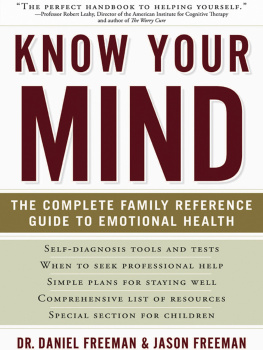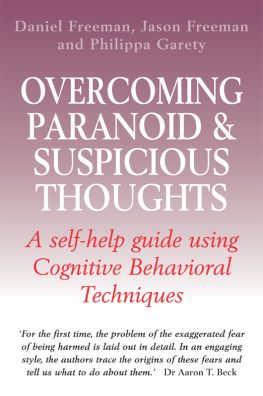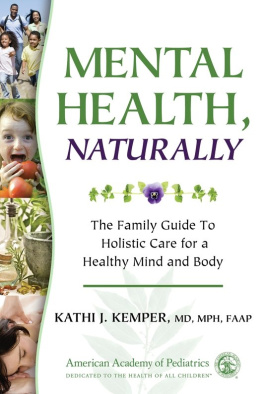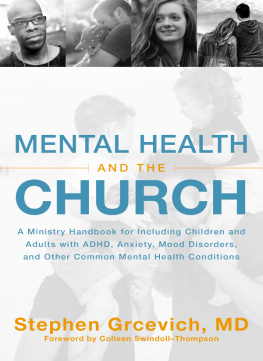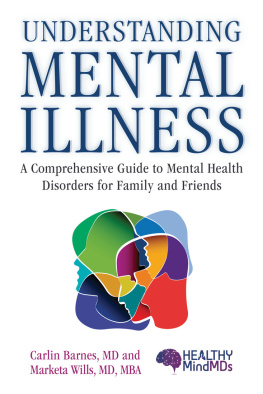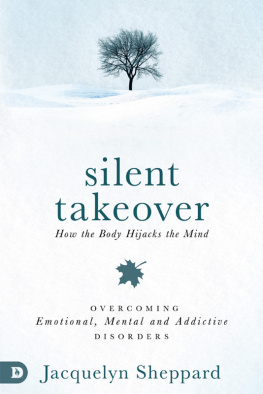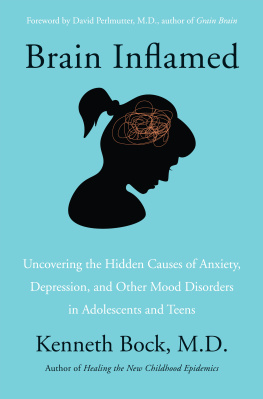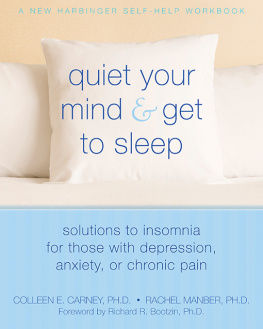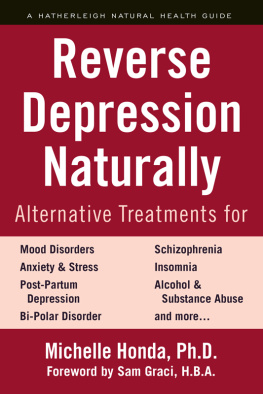STERLING and the distinctive Sterling logo are registered trademarks of Sterling Publishing Co., Inc.
Published in 2010 by Sterling Publishing Co., Inc.
387 Park Avenue South, New York, NY 10016
2009 by Daniel Freeman and Jason Freeman
First edition published by Rodale in 2009.
Distributed in Canada by Sterling Publishing
c/o Canadian Manda Group, 165 Dufferin Street,
Toronto, Ontario, Canada M6K 3H6
For information about custom editions, special sales, premium and corporate purchases, please contact Sterling Special Sales Department at 800-805-5489 or specialsales@sterlingpublishing.com.
Over the following 300 or so pages, youll find information on more than 50 of the most common psychological and emotional problemshow to recognize them, how theyre caused, and, crucially, what to do about them.
KNOW YOUR MIND IS, THEREFORE, a kind of super self-help book, offering in one volume the very best psychological thinking and therapeutic advice. But although the bulk of Know Your Mind focuses on problems, this is only one part of the story. Just as important are the steps you can take to minimize the chances of being affected by these issues.
So in this introduction we show you how to stay in the best possible psychological and emotional health. Before that, however, we explain how we came to write Know Your Mind, the theoretical background we draw on, and what to do if more help is needed.
If youve ever browsed the self-help section of a large bookstore, youll know just how bewildering the experience can be. The choices are simply overwhelming. And if you do happen to pick a title from the groaning shelves, how can you be sure that the advice youll be getting is reliable?
Know Your Mind is designed to rescue readers from this predicament. Rather than having to plow through thousands of self-help books, many of unknown quality, you will find here a comprehensive distillation of the very best information and advice. This book is thus the culmination of countless hours of reading self-help books!
But more important, Know Your Mind is also the product of many years of clinical practice and psychological research, together with analysis of the latest psychological and scientific literature, clinical trials, and officially recommended treatment guidelines. Each of the entries has also been reviewed by clinical psychologists.
The information in Know Your Mind is scientifically tried and tested, but notwe hopedry or difficult. Indeed, one of our main objectives has been to present this material in as entertaining and accessible a style as possible. That said, the questionnaires are exactly the same as those used by clinicians; even if you find some of them a bit tough to get through, keep going, because youll be getting the most accurate self-assessment possible.
In most cases, Know Your Mind is likely to provide all the information you need to overcome whatever psychological or emotional problem is troubling you. But what should you do if you feel you need more help? And how, for that matter, can you tell whether or not you should seek personal professional advice?
Theres no easy way to answer this second question. Basically it comes down to:
How distressing youre finding the problem.
How much its disrupting your life.
But however well you think youre coping, if you want to explore further treatment options, you should do so.
Start by seeing your own physician. Just talking things over can be a huge help. If you think psychological therapy (also called psychotherapy or talking therapy) might be useful, your physician should be able to guide you through the options and make a referral. Medication is also an option in some cases.
Incidentally, the Internet provides information and guidelines for both physicians and patients. Medscape (www.medscape.com) is directed at physicians and other medical professionals, with guidelines for treating psychological (as well as physical) problems. The WebMD site (www.webmd.com) provides summaries of these guidelines for the general public. The National Institute of Mental Health (www.nimh.nih.gov) provides information for both physicians and patients. The American Psychological Association (www.apa.org) addresses medical specialists in the treatment of psychological disorders.
The therapeutic advice in Know Your Mind draws on numerous theoretical approachesif its been scientifically proven to work, its in here. That said, our main influence is a type of psychological therapy called Cognitive Behavior Therapy (CBT).
CBT was first developed in the 1960s by Professor Aaron Beck as a treatment for depression. Since then, its been used very successfully to help people with many other psychological problems. CBT is based on the insight that if we can understand and change the way we think and the beliefs we hold about ourselves and the world around us, well also be able to change the way we feel and behave.
CBT has been subjected to repeated, rigorous clinical assessment. Although it doesnt work for everyone, its generally so effective that its now the official treatment of choice for a very wide range of emotional and psychological problems.
If you do see a therapist (specializing either in CBT or in other approaches), its crucial that he or she has been properly trained. This may seem obvious, but in the United States the terms counselor, therapist, and psychologist can be used by people with a wide range of experience and training. Your best bet is to check with one of the professional organizations that keep registers of accredited therapists. In the United States, these are the National Association of Cognitive-Behavioral Therapists and the American Psychological Association. Youll find their contact details under Useful Organizations on p. 369.
Last but certainly not least, if theres one message we hope youll take from this book, it is that emotional and psychological problems are normal. Far from being a sign that youre weak or inadequate, or that youre going crazy, theyre as much a part of life as any physical problem.
Most people dont feel ashamed when they come down with the flu, or when their back is causing them pain. They dont believe that these ailments are a reflection of their worth as a human being. They tell people how theyre feeling (sometimes ad nauseam!) and try to sort out the problem, whether by taking over-the-counter medication, seeing their physician, or reading up on the issue in question.
Although the tide is slowly turning, most people are still not nearly so comfortable when it comes to being open about their psychological and emotional health: Almost everyone goes through periods of feeling very stressed, anxious, or down; sometimes finding it difficult to sleep or to get a grip on drinking or eating; struggling with relationships and how best to raise children. Yet theyre much less likely to share these sorts of problems with friends and family or to seek professional help.
Know Your Mind aims to dispel the awkwardness and stigma surrounding these issues. Remember: Whatever youre going through, you can be certain that someone you know has had exactly the same problem at some stage in his or her life.

